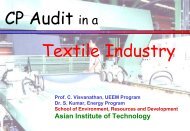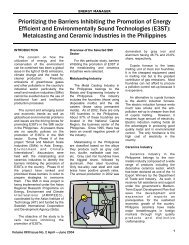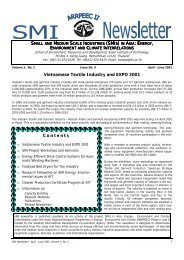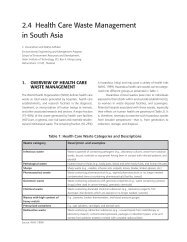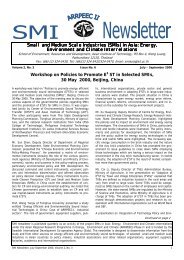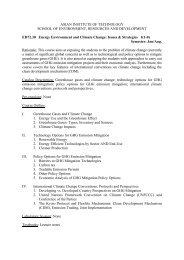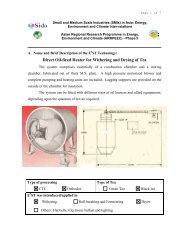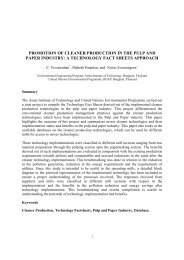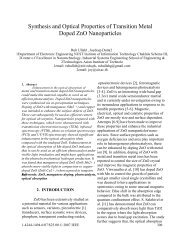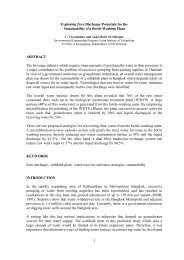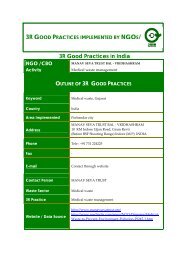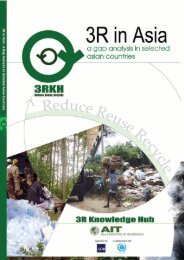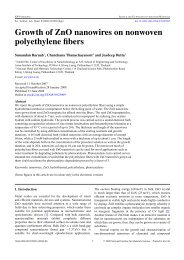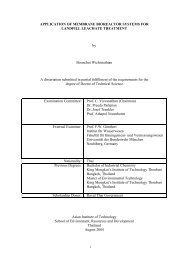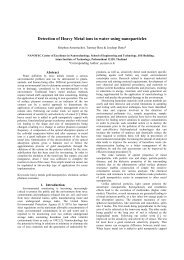Evaluation of Plastic Waste Management in Thailand Using Material ...
Evaluation of Plastic Waste Management in Thailand Using Material ...
Evaluation of Plastic Waste Management in Thailand Using Material ...
Create successful ePaper yourself
Turn your PDF publications into a flip-book with our unique Google optimized e-Paper software.
<strong>of</strong> them. For example, one <strong>in</strong>dividual waste generator may not seem to be as<br />
important as policy makers or recyclers, but can cause high effects/<strong>in</strong>fluence on the<br />
plastic waste management by generat<strong>in</strong>g reckless amount <strong>of</strong> plastic waste, not<br />
participat<strong>in</strong>g <strong>in</strong> source separation and recycl<strong>in</strong>g activities.<br />
Group D: Stakeholders with low importance and low <strong>in</strong>fluence are unlikely to be<br />
the direct subject <strong>of</strong> plastic waste management schemes, but can help <strong>in</strong><br />
<strong>in</strong>formation shar<strong>in</strong>g and rais<strong>in</strong>g awareness hence support<strong>in</strong>g the plastic waste<br />
management strategies and goals. NGOs normally fall under this Group.<br />
4.4.3 Roles and op<strong>in</strong>ions <strong>of</strong> stakeholders<br />
Identification <strong>of</strong> roles and their respective op<strong>in</strong>ions have great <strong>in</strong>fluence on overall plastic<br />
waste management. Some stakeholders <strong>in</strong> Figure 4.37 who were <strong>in</strong>terviewed are classified<br />
<strong>in</strong>to five components/processes <strong>of</strong> plastic waste management: plastic manufactur<strong>in</strong>g,<br />
plastic consumption, waste collection and transportation, recycl<strong>in</strong>g, and waste disposal.<br />
<strong>Plastic</strong> Manufactur<strong>in</strong>g Stakeholders<br />
These stakeholders are the plastic produc<strong>in</strong>g organizations/companies. Not only the actual<br />
plastic manufacturers, but the technology providers such as Thai <strong>Plastic</strong> <strong>in</strong>dustries<br />
association (TPIA) fall under this category. Stakeholders like TPIA supports the plastic<br />
manufactur<strong>in</strong>g factories by provid<strong>in</strong>g technology knowledge, product designs, markets,<br />
<strong>in</strong>formation shar<strong>in</strong>g, and producer networks. Similarly, Thai Bioplastics Industry<br />
Association (TBIA) and <strong>Plastic</strong> Institute <strong>of</strong> <strong>Thailand</strong> (PIT) provides similar support to the<br />
plastic manufactures. TBIA only focuses on the biodegradable plastic products and<br />
producers.<br />
The petrochemical <strong>in</strong>dustries who supply the plastic res<strong>in</strong>s (raw materials) to plastic<br />
converters and are the members <strong>of</strong> Petroleum Institute <strong>of</strong> <strong>Thailand</strong> (PTIT) are also the<br />
stakeholders <strong>in</strong> this group. PTIT is the <strong>in</strong>formation shar<strong>in</strong>g stakeholder for plastic waste<br />
management <strong>in</strong> <strong>Thailand</strong> because it collects the <strong>in</strong>formation from plastic <strong>in</strong>dustry and<br />
presents the petrochemical consumption and plastic production <strong>of</strong> plastic <strong>in</strong>dustry.<br />
Department <strong>of</strong> <strong>in</strong>dustrial Works (DIW) and Department <strong>of</strong> Industrial Promotion (DIP)<br />
support the Public-Private sector <strong>in</strong>stitution and plastic companies. The environmental<br />
issues from plastic <strong>in</strong>dustry are control by DIW, while, DIP provides funds and markets for<br />
plastic <strong>in</strong>dustries <strong>in</strong>clud<strong>in</strong>g the promotion <strong>of</strong> <strong>in</strong>vestment <strong>in</strong> both <strong>of</strong> country and foreign<br />
countries.<br />
Office <strong>of</strong> Industrial Economics (OIE) is an <strong>in</strong>formation shar<strong>in</strong>g stakeholder who shares the<br />
plastic <strong>in</strong>dustry statistic and evaluates economic trends <strong>of</strong> plastic <strong>in</strong>dustry. <strong>Plastic</strong><br />
Intelligence Unit (PIU) is under OIE and PTIT. It presents <strong>in</strong>formation on Thai and world<br />
plastic production such as plastic knowledge and technology, prices <strong>of</strong> plastic res<strong>in</strong>s,<br />
import-export statistics and plastic production data base.<br />
PIT stated that the plastic <strong>in</strong>dustry should label seven codes <strong>of</strong> recyclable plastics on<br />
plastic products. These codes will make people separate plastic wastes easily. The green<br />
production and green products are the related projects <strong>of</strong> <strong>in</strong>dustrial sector to save the<br />
environment. The biodegradable plastics will become the new issue <strong>of</strong> plastic waste<br />
management because there are TBIA and NIA which are study<strong>in</strong>g the possible production<br />
90



